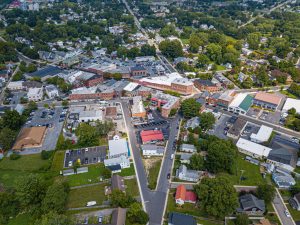
BERLIN– A discussion regarding accessory dwelling units dominated a meeting of the Berlin Planning Commission last week.
The Berlin Planning Commission last Wednesday hosted a lengthy discussion about accessory dwelling units—things like garage apartments—and whether they should be permitted in town. In the end they asked staff to review the regulations in place in towns similar to Berlin.
“We’re not the only people with this problem, this thought process,” commission member Matt Stoehr said.
Planning Director Dave Engelhart said some commission members had requested that accessory dwelling units be placed on the agenda for discussion. Currently, town code defines accessory living quarters as an accessory building used by guest of a home’s occupants on a temporary basis. The units can’t contain a kitchen and can’t be rented. He said the current regulations dated back to the 1970s.
“They didn’t want a proliferation of rental units and the parking problems they brought on some streets,” he said.
He acknowledged that there were units around town that didn’t conform with the regulations.
“When we know about it we try to enforce it,” he said. “It’s not always that easy.”
Commission member Newt Chandler said he liked the existing regulations. He said longtime residents of the town’s R-1 and R-2 residential districts had bought where they had so they could have the “quiet enjoyment of their property.” Chandler said more and more people from metropolitan places were moving to Berlin and he didn’t want them making changes that increased density in the R-1 and R-2 districts.
“These people are coming from places where they’re used to being packed in so it doesn’t bother them,” he said, adding that it would however change neighborhoods that had long been considered quiet.
Commission member Austin Purnell disagreed and said the code should be updated.
“Modern times call for some modern revisions,” he said. “With sensible regulations you can do it.”
He added that it was a way homeowners could bring in more money to help pay their mortgage.
“I think there’s a lot of opportunity there,” he said.
Engelhart asked how parking would be handled if accessory dwelling units were allowed in town.
“It has to be off street,” commission member Ron Cascio said.
He added that neighbors would advise Engelhart’s office if too many people were parking on the street. Engelhart, however, said that it would still be difficult to enforce.
“That’s a big hurdle,” Stoehr acknowledged.
Cascio said he believed neighbors would essentially police places that had accessory dwelling units. He said the world had changed and it was time for Berlin to update its code. Cascio said currently, the majority of the town’s rentals were at Oceans East.
“It’s segregation,” he said. “We’re putting all renters in one place.”
He believes the town should provide options for homeowners who want to move their mother-in-law or young adult children into an accessory unit on their property. He added that there were people who couldn’t afford the rent at local apartments who might want to rent an accessory unit.
“There’s a lot of people who we could accommodate with the proper provisions—the main one being that one of the buildings is occupied by the property owner,” he said.
Chandler said people were fleeing the exact thing Cascio was advocating for.
“They’re heaped in on each other…they’re trying to escape that,” he said.
Chandler stressed that he didn’t want to see the code changed.
“This is a place where people can buy a piece of property and enjoy quiet living and not a bunch of noise next door,” he said.
Purnell said commission members often argued in favor of infill development and that could be accomplished with accessory units.
“Even if you allow it doesn’t mean everybody’s going to do it,” he said.
Cascio agreed and said the proper regulation—related to minimum and maximum square footage, parking and licensing—could ensure it didn’t cause problems.
Resident Marie Velong said a lot of the concerns being expressed related to potential accessory units being rented when she felt in many cases they might simply be used by family members of the property owner.
“It’s not all about rentals,” she said.
Resident Gina Velong pointed out that the problems Chandler was concerned about—noise and parking, for example—could be created just as easily by someone who purchased a home. She added that he was making the assumption people would add an accessory unit for commercial reasons when they might in fact be doing it to provide a family member with a place to stay.
“We’re zoning people we’re not social workers,” Chandler replied.
Stoehr noted that if there were existing accessory dwelling units, if the town updated the code to allow them they’d have to be updated to meet requirements, something that could be an expensive proposition.
Cascio said concerns like the ones being raised were all part of the discussion that should accompany any code change.
“Zoning is never stagnant it’s always dynamic and it’s because life and situations have changed,” he said. “Now situations have changed.”
Engelhart said if the commission wanted to open the code up to allow for family members to live in accessory dwelling units, they could change the language but not so much that renting accessory units was permitted.
“That’s one way of allowing it but not allowing it to explode,” he said.
Cascio agreed that was one way.
“The other way is to have it rented under serious conditions,” he said. “I think it’s a matter of discussion.”
The commission agreed to ask staff to research accessory dwelling unit regulations in towns comparable to Berlin.

